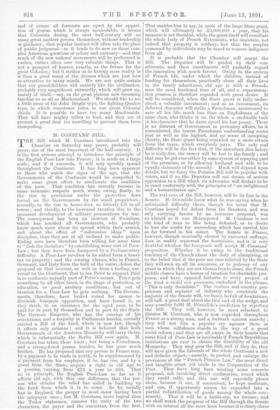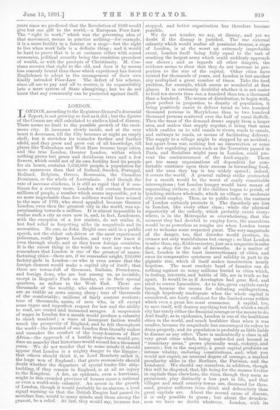M. CONSTANS' BILL. T HE Bill which M. Constans introduced into
the Chamber on Saturday may prove, probably will prove, one of the most important of the half-century. It is the first serious attempt to introduce the principle of the English Poor-Law into France ; it is made on a large scale ; and if it succeeds, it will very speedily spread throughout the Continent. It 13as long been apparent to those who watch the signs of the age, that the Governments of the Continent would be compelled to make some great effort to ameliorate the condition of the poor. That condition has recently become in some economic respects much worse, owing, firstly, to the rise in provisions under the protective laws forced on the Governments by the small proprietors ; secondly, to the rise in house-rent, so bitterly felt in all towns ; and thirdly, to the increased taxation due to the incessant development of military preparations for war. The consequence has been an increase of Socialism, which has terrified all Governments, who probably know much more about its spread within their armies, and about the effect of " subversive ideas " upon discipline, than they are at all inclined to make public. Ruling men have therefore been willing for some time to "dish the Socialists" by establishing some sort of Poor- Law ; but they have been hampered by a Parliamentary difficulty. A Poor-Law involves in its naked form a heavy tax on property ; and the owning classes, who in France, Germany, and Italy form the bulk of the voters, detest the proposal on that account, as well as from a feeling, uni- versal on the Continent, that to tax Peter to support Paul is to confiscate unjustly part of Peter's means. Peter gets something by all other taxes, in the shape of protection, or education, or good sanitary conditions ; but out of taxation for a Poor-Law he gets nothing. The Govern- ments, therefore, have looked round for means to diminish bourgeois opposition, and have found it, as they think, in an insurance for the aged poor, to be paid for in part by themselves and in part by the State. The German Emperor, who has the courage of his convictions, and a majority in Parliament besides, actually carried a Bill of the kind, which is now law, though it affects only artisans ; and it is believed that both Governments of the Austrian Monarchy will carry theirs, which is substantially the Berlin Bill over again. M. Constans has taken these hints ; but being a Frenchman, and a strong-fisted person besides, he has gone much further. He has proposed that any person in France may, by a payment to be made in youth, to be supplemented by a payment from his employer, if he has one, and by a grant from the State, acquire a right in old age to a pension, varying from .42 a year to £24. That is, in principle, the English Poor-Law so far as it affects old age, with this ono difference, that the per- son who obtains the relief has aided in building up the fund from which it is to come. So he usually has in England, the pauper in most cases having been the ratepayer once ; but M. Constans, more logical than the Tudor statesmen, ensures the unity of the two characters, the payer and the annuitant, from the first. That enables him to say, in spite of the large State grant, which will ultimately be £4,000,000 a year, that his measure is not Socialist, while the grant itself will conciliate the whole body of French Extremists, who maintain, not indeed that property is robbery, but that the surplus possessed by individuals may be taxed to remove indigence from all.
It is probable that the Chamber will accept the Bill. The Deputies will be guided by their con- stituents, and their constituents will probably regard the innovation with much favour. Owing to the system of French life, under which the children, instead of fending for themselves, practically share all their lives in the family inheritance, old age is with a French- man the most burdened time of all, and a superannua- tiou pension is therefore regarded with great desire. It will be considered, when the State grant is fully under- stood, a valuable investment ; and as an investment, its deferred character will strike a Frenchman, accustomed to save all his life, much less than an Englishman of the same class, who thinks it on the whole a creditable trait in his character that he dares spend his last penny. There is no distrust of Government in pecuniary affairs, be it remembered, the lowest Frenchman understanding rentes just as well as the highest, and no sense of accepting charity, the State grant being regarded as a mere return from the taxes, which everybody pays. The only real difficulty will be the fact that, if the annuitant dies before he is sixty-five, the money will be lost to the family ; and that may be got over either by some system of repaying part of the premium, or by allowing husband and wife to be equally claimants of the annuity. Much will depend upon details, but we fancy the Pension Bill will be popular with voters, and if so, the Deputies will not dream of serious opposition to a Bill which its advocates will declare to be in exact conformity with the principles of "an enlightened and a humanitarian age."
The real crux of the Bill, however, will be its fate in the Senate. M. Nroulede know what he was saying when he anticipated difficulty there, though his taunt that M. Constans hoped for defeat from the Senators, and was only currying favour by an insincere proposal, was as absurd as it was ill-tempered. M. Constans is not the kind of man to like being defeated, or to desire to lose the credit for succeeding which has carried him so far forward in his career. The Senate in France, however, though nominally elected by universal suffrage, does in reality represent the bourgeoisie, and, it is very doubtful whether the bowrgeosie will accept M. Constans proposition. Whether it be owing to the traditional teaching of the Church about the duty of almsgiving, or to the belief that if the poor are once relieved by the State they will suck up all its resources, or to jealousy of any grant in which they are not themselves to share, the French middle classes have a horror of taxation for charitable pur- poses, and have opposed hitherto to every project of the kind a stolid non possumus, embodied in the phrase, "This is only Socialism." The rentiers and country pro- prietors and captains of industry who constitute the majority of the Senate will, we fancy, be full of hesitations, will talk a great deal about the thin end of the wedge, and may possibly fulfil M. DdrouThcle's prediction by rejecting the Bill. They will, however, be most reluctant to dismiss M. Constans, who is now regarded throughout France as a strong man, and a bulwark against anarchy ; they will not like a popular cry against them as men whose selfishness stands in the way of a great social reform k and they are all aware in their hearts that some kind of Poor-Law is inevitable if French Republican institutions are ever to obtain the durability of the old Monarchy. They may pass the Bill, and if they do, they will have given the Liberals of the whole Continent a new and definite object,—namely, to perfect and enlarge the provisions of the "French Pension Law," the most direct and tangible grant yet made to the Corporation of the Poor. They have long been wanting some concrete proposal, not involving direct confiscation, round which they could rally, and this one will especially please them, because it can, if convenient, be kept moderate, and can, if opportunity serves, be expanded into a partial redistribution of goods among the whole com- munity. That it will be a battle-cry, we foresee' and we shall watch the progress of the Bill through the Senate with an interest all the more keen because it is thirty-three years since we predicted that the Revolution of 1848 would give but one gift to the world,—a European Poor-Law. The "right to work," which was the governing idea of that movement, means in practice nothing—for example, it is a mere futility in a famine or a siege—but the right to live when work fails is a definite thing ; and it would be hard to prove that it is at variance either with sound economics, political security being the condition precedent of wealth, or with the precepts of Christianity. M. Con- stans secures that right to the old, and does it by means less coarsely brutal than those which expediency has forced Englishmen to adopt in the management of their own kindly intended Poor-Law. The defect of his scheme, since all are to pay and all to receive, is its expansibility into a more system of State almsgiving ; but we do not know that any community can be protected against itself.



































 Previous page
Previous page